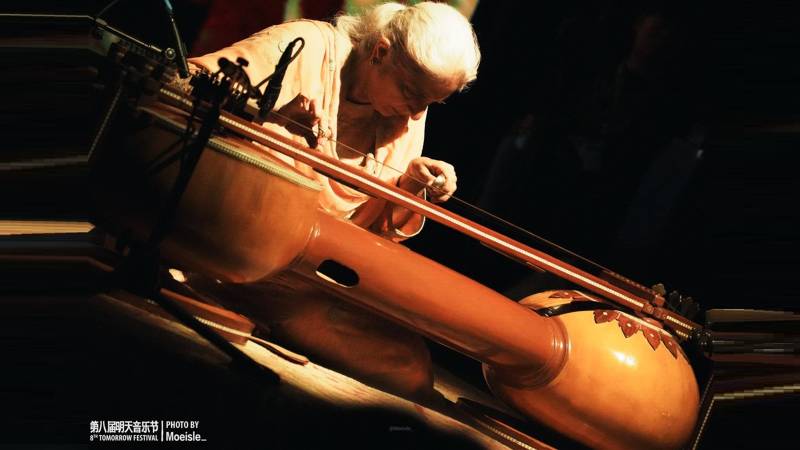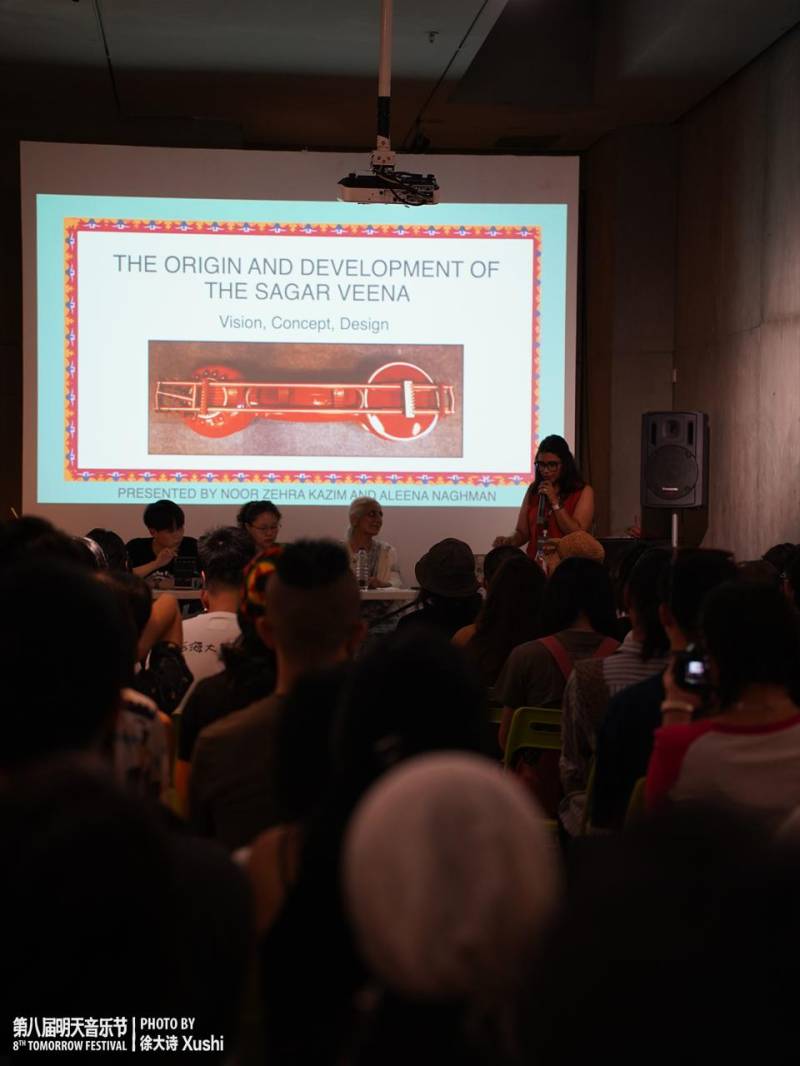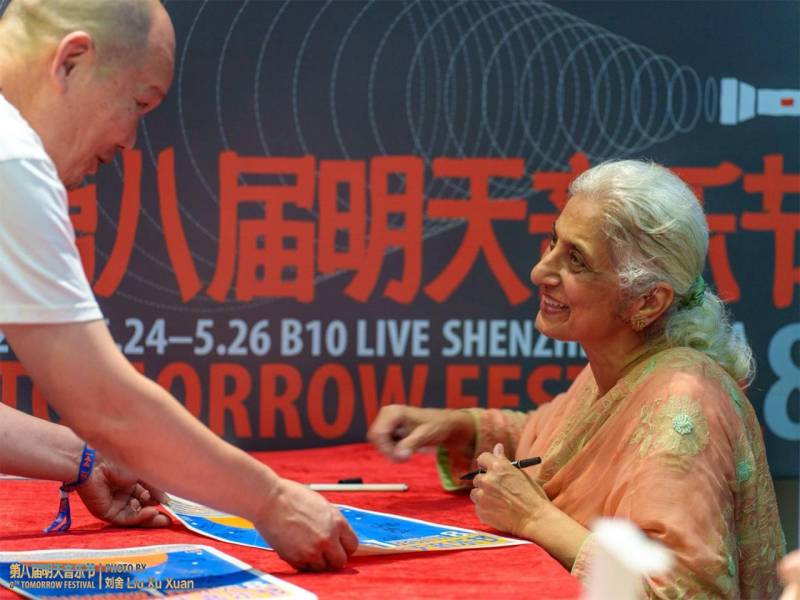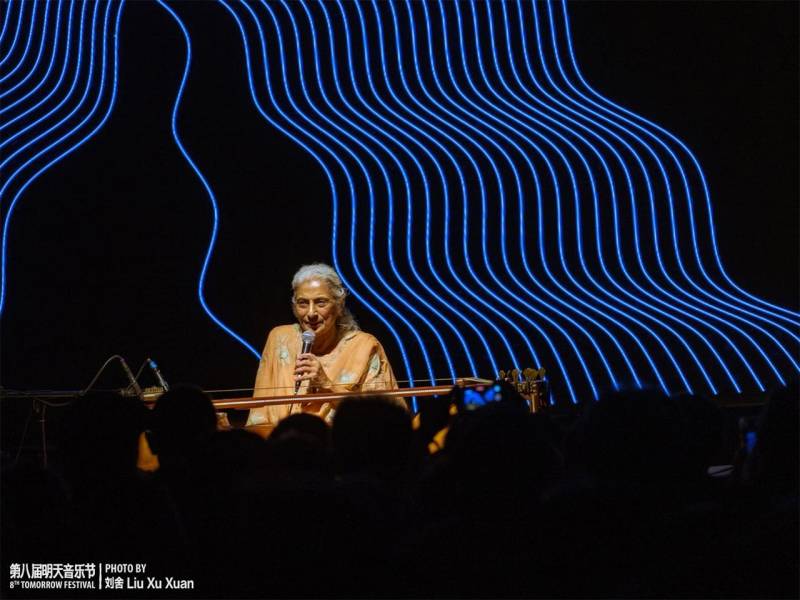
On 26 May the city of Shenzhen in southeast China experienced a most singular artistic event: a solo performance by Noor Zehra Kazim on the Sagar Veena, an instrument designed specifically for her by her father the renowned lawyer, intellectual, and advocate for democracy Raza Kazim. It was the latest stage in a long odyssey.
Noor Zehra was yet in her teens when her extraordinary musical journey commenced. Born into a household that shone with scholarship, culture, musical appreciation and expertise, the context is not surprising. Her mother Kishwar herself possessed a liltingly lovely voice into her eldest days.
Raza wanted to create and perfect an instrument of classical music – South Asian Classical Music – to capture and surpass the range and quality of the human voice as no instrument had done before.
In 1970, to counter the ‘invasion’ of western popular music, he arranged for his four children to be tutored in sitar, tabla, and vocal music by Ustad Nisar Husain.

Realising soon that Noor Zehra was more attuned to low rather than high tempo instruments, Raza switched her training to the ‘bass sitar’: the Surbahar (or Kachuwa); and then to the unfretted Vichitra Veena, believed to have been invented in the early 20th century by Ustad Abdul Aziz Khan, the word having a myriad of meanings – “wonderful, surprising, beautiful” inter alia. As it was however difficult to keep the single raag traditionally taught in tune without frets, Raza removed these from the Surbahar, when “lo and behold! It sounded better than the Vichitra Veena!” And this, historically, became the initial prototype of the Sagar Veena: an instrument for “endless expression; ‘sagar’ being Sanskrit for ‘ocean’, and ‘veena’ meaning ‘stringed instrument.”
The creation of Raza’s evolved instrument took five versions, across a timeframe of over four decades, from 1970 to 2012; incorporating adjustments and alterations mostly to the vibrating and resonating chambers, uniquely for any stringed instrument structurally separate in the Sagar Veena.
His three requirements for this magnum opus comprised: the capacity for 9 timbres, 4.5 to 5.5 octaves, and a resonance to echo human sentiments and the quality of the human voice.
Its concept was to enable the exponent to evoke an emotional response in the minds of her or his audiences.
Raza’s recording methods were similarly original, using three microphones, and the unique ‘Bulleh’ sound recording system (named for Bulleh Shah) he had himself designed and refined with three of the best sound engineers from abroad brought to Lahore for this purpose. A superior system considered too expensive to replicate.

By 1990 it was clear that Raza’s passion for and involvement with the Sagar Veena went much beyond a quest for the perfect instrument for his daughter; rather it transcended the personal to become his lasting contribution to music and to his country. He established, in collaboration with the National College of Arts (NCA) Lahore, our first Musicology Department. In 2023 both he and Noor Zehra were honoured with Lifetime Achievement Awards by the All Pakistan Music Conference (APMC).
Noor Zehra’s epic quest commenced in 1970 with the need to learn from an established instrumentalist. As India was then not a viable destination for this purpose for political reasons, Raza sent her to the UK initially to study with Dr Rajeshwari Dutta, Head of SOAS’s India Department. Never the person to do anything by halves, Raza rented for his daughter - and two members of their family/friend’s circle - an apartment near Marble Arch in central London: “Imagine a seventeen-year-old living on Seymour Street!” Noor Zehra reflects amusedly.
Though this training lasted nine months, it did not result in any real progress, until later that year, aged almost eighteen, Noor Zehra was enthralled to meet the great Sarod maestro Ustad Ali Akbar Khan after his concert in London. In her own words, “I was an admirer of his music since the age of fourteen thanks to Raza’s collection of LPs, and it was a dream come true to see him perform live, to talk to him afterwards, and to get the opportunity to play the Sagar Veena for him!” He offered her then and there a place at his academy, the Ali Akbar College of Music (AACM) in San Rafael, Marin County, California.
So that is where, accompanied by her mother, Noor Zehra spent her eighteenth birthday. She was there for two semesters and six months. In some ways it was indeed “a great learning experience.” She was tutored personally by Ustad Ali Akbar for three sessions, and discovered that the students there, mostly American and originally pupils of western classical music, had their own system of studying, effective for themselves but not necessarily for those from elsewhere. The teachers were mostly Indian. Despite “the enjoyment of making friends and experiencing an alternate culture” Noor Zehra realised that this too was not an environment in which she could effectively learn. On hearing she was returning to Pakistan, the Maestro proclaimed she would “go home, get married and have two kids, and bid farewell to music!” “Half of what he said was true!” she remarks.
Both the Consulate General and the festival organisers agreed that this should be the start of a round of musical performances from Pakistan in Shenzhen - just like those by Chinese artistes who have often given dazzling displays of classical music and dance
The “real learning experience” Noor Zehra recalls, were the two years from October 1973 to November 1975 in Lahore when master of Sitar and Vichitra Veena, Ustad Mohammad Sharif Khan Poonchwala, came to tutor her at Raza’s Gulberg residence. “It was intense and intensive both: daily sessions of up to three and a half hours, six days a week.” After this rigorous training, and getting married in 1976, further formal learning was not possible.
Noor Zehra however has gone on to perform as a solo artiste on the Sagar Veena at multiple arenas both in Pakistan and abroad: in 1983 and 1985 on PTV (firstly the morning raag Bilaskhani Todi); in 1987 at the APMC annual event, Lahore; in 1999 at the Okinawa Arts Council, Japan; in 2010 at The Ted X, Lahore; in India in Delhi, Bhopal, and Chandigarh at the 2011 Annual Music Festival; and also in 2011 at the First Pakistani Mela in Oslo, Norway.

And now we come to Noor Zehra - and her likewise phenomenally talented family - her sons Ali Noor and Ali Hamza (Noori) - recording and appearing on Pakistan’s largest and best produced musical platform, the stunning Coke Studio. In 2010 her Sagar Veena was first heard and seen there with “Hor we Neevan ho”, and in 2016 with “Paar Chana de.” Noor Zehra performed with Noori in 2016, as did her talented in his own right husband Ali Kazim (the very able and distinguished former CSP officer), taking the lead with his sons joining him, in his remarkable rendition of the ghazal “Dil hi to Hae.”
And in May 2024 at Tomorrow Eighth, the alternate music platform in Shenzhen. Here we had Ms Lowi-hu E, Program Coordinator for the music festival, herself an admirer and exponent of the Veena. She had heard of both this new instrument the Sagar Veena and its sole performer, and insisted that whatever the logistic and other difficulties, she must be brought to Shenzhen to both explain how this unique instrument evolved and to perform. And there were many unforeseen hurdles.
First of all the Chinese Embassy in Pakistan required work performance visas, and on acquiring the documentation from Shenzhen most efficiently accorded both Noor Zehra and her able assistant Aleena Naghman visas promptly, unlike the practice of most embassies. Secondly, under new airline rules, the instrument could not be sent as accompanied baggage. Our Ambassador in Beijing Khalil Hashmi was determined that this cross-cultural event should proceed. Our Consul General in Guangzhou Sardar Muhammad suggested freight forwarders from the Foreign Office list who might help. Amongst them, Ms Hina Hashmi rose to the challenge. Aleena drove all night to Islamabad, and the next day Hina ensured that the 36 kg musical instrument was sent as airfreight just in time for the performance. It was a close-run thing! Thirdly, when Noor Zehra and Aleena reached the airport they found they could not board the Gulf airline as, since they were going to give a performance, even though without renumeration, a stamp was required from the Protector of Emigrants Office in the Bureau of Emigration and Overseas Employment, Lahore. Again with the support of the Foreign Office and this Bureau they obtained the necessary stamp the very next day, enabling them to take a direct flight by South China Airlines that evening, direct to Shenzhen.
They were warmly welcomed and duly honoured in Shenzhen both by Pakistan’s Consulate General and the Festival organisers led by Ms Lowi. Our Ambassador came to Shenzhen to attend a dinner for the duo hosted by the Consul General. The organisers looked after them grandly and Ms Lowi herself accompanied them to the airport on their departure. Both the Consulate General and the festival organisers agreed that this should be the start of a round of musical performances from Pakistan in Shenzhen. Just like those by Chinese artistes who have often given dazzling displays of classical music and dance – both theirs and ours, including of Kathak! – in Islamabad and elsewhere in our country.
With the invaluable assistance of Aleena, almost a daughter and without whom she would not have braved this arduous journey, Noor Zehra gave a two-hour presentation on the evolution of the instrument. Then after a break, a two-hour music recitation on the Sagar Veena itself.
The photos of the Shenzhen event speak for themselves; we can imagine how magical the sound; and see the total concentration of the artiste, and the absolute attention – and appreciation – of her audience.
Soft-spoken and graceful, Noor Zehra Kazim is an artiste to be admired and heard with enchantment. The experience is almost ethereal.
The writer was trained in classical dance by Maharaj Ghulam Hussain Kathak

